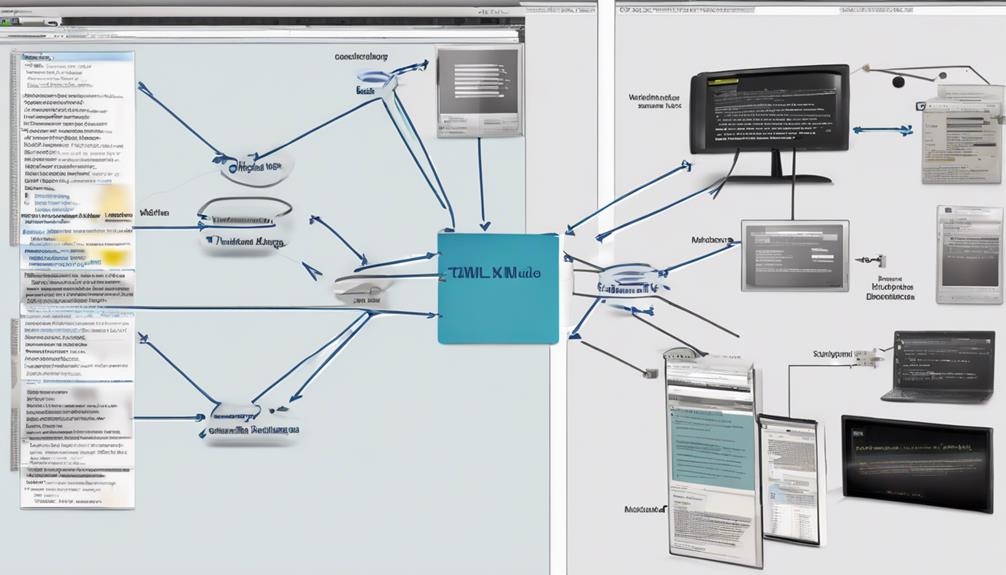By employing XML conversion services, you can optimize your operational efficiency using six key methods. From streamlining processes to enhancing compatibility, these strategies offer a range of benefits that can transform your workflow. Each method plays a crucial role in boosting productivity and accuracy within your organization. Discover the methods to improve efficiency with XML Conversion Services and how these efficiency-boosting techniques can revolutionize your data management practices and propel your business towards greater success.
Streamlining Processes With XML Conversion
By implementing XML conversion services, you can streamline your processes significantly. Process optimization is key when looking to enhance the efficiency of your workflow. XML conversion allows for the automated transformation of data into a structured format, enabling seamless integration with various systems and applications. Through this automation, repetitive tasks are eliminated, reducing the chances of errors and saving valuable time.
Workflow automation is a crucial aspect of process optimization. XML conversion services provide the capability to automate the conversion of data from one format to another, ensuring a smooth flow of information within your organization. This automation reduces manual intervention, thereby minimizing the risk of human errors and increasing productivity. By integrating XML conversion into your processes, you can achieve a more efficient workflow that is tailored to meet your specific needs. Optimize your processes today with XML conversion services for enhanced workflow automation.
XML Conversion for Faster Data Access
By converting data into XML format, you can accelerate the process of retrieving information from databases. XML conversion services help enhance data accessibility by organizing and structuring data in a standardized manner. This streamlined format enables faster data access, improving overall efficiency in data retrieval processes.
Speed Up Data Retrieval
Enhancing data retrieval speed is a critical aspect of optimizing efficiency in modern information systems. To achieve this, focus on data optimization and query efficiency. Data optimization involves structuring and organizing data in XML format to facilitate quicker retrieval. By converting data into XML, you create a more streamlined and efficient system for accessing information.
Query efficiency plays a crucial role in speeding up data retrieval. When executing queries on XML data, ensure they are well-structured and targeted to retrieve specific information promptly. Utilize indexing techniques to enhance query performance, enabling faster access to the required data. By optimizing queries, you reduce processing time and improve overall system efficiency.
In addition to data optimization and query efficiency, consider implementing caching mechanisms to store frequently accessed data temporarily. This strategy can significantly reduce retrieval time by retrieving cached data instead of fetching it from the database repeatedly. By incorporating these methods, you can effectively speed up data retrieval and enhance the overall efficiency of your information system.
Enhance Data Accessibility
Improving data accessibility is a crucial component in optimizing system efficiency within modern information frameworks. By enhancing data accessibility through XML conversion services, you can significantly improve searchability and data integration within your organization. XML conversion allows for the transformation of data into a structured format that is easily searchable and retrievable. This structured approach enables quicker access to information, leading to faster decision-making processes and enhanced overall productivity.
Furthermore, XML conversion facilitates seamless data integration across various platforms and systems. By converting data into XML format, you can ensure compatibility and consistency in data representation, making it easier to transfer and access information across different applications. This streamlined data accessibility not only improves operational efficiency but also enhances collaboration and knowledge sharing among team members.
XML Conversion for Improved Data Management
When considering XML conversion for improved data management, it’s essential to focus on the benefits of data organization. By converting data into XML format, you can streamline information handling processes, making it easier to access, retrieve, and manipulate data efficiently. This approach enhances data management practices, leading to increased productivity and more effective decision-making within your organization.
Data Organization Benefits
Data organization benefits can be significantly enhanced through the utilization of XML conversion services for improved data management. By employing data classification techniques, XML conversion allows for the systematic categorization of information based on predefined criteria. This structured approach enables easy retrieval and efficient management of data, leading to enhanced organization within your database.
Furthermore, XML conversion facilitates the structuring of information in a standardized format, ensuring consistency and coherence across all data elements. This uniformity not only streamlines data access but also simplifies the integration of information from various sources. As a result, you can effectively manage and manipulate your data with precision and accuracy.
In essence, leveraging XML conversion services for data organization offers a strategic advantage by optimizing the classification and structuring of information. This, in turn, enhances the overall efficiency of data management processes, enabling you to make informed decisions and drive business growth effectively.
Streamlining Information Handling
Enhancing the efficiency of your data management processes can be further optimized by streamlining information handling through XML conversion services. By converting your data into XML format, you can significantly increase productivity and streamline the way information is managed within your organization. XML conversion allows for structured data organization, making it easier to search, retrieve, and analyze information.
One key benefit of streamlining information handling through XML conversion is the optimization of data storage. XML files are known for their flexibility and scalability, allowing for efficient storage of large volumes of data in a structured manner. This not only saves storage space but also enhances data retrieval speed, contributing to improved overall productivity.
Moreover, XML conversion services enable seamless integration with various software applications, facilitating smooth data exchange and enhancing collaboration among different departments. By optimizing data handling through XML conversion, you can ensure that your organization operates more efficiently, with streamlined processes and improved data management practices.
XML Conversion for Better Decision Making
Utilizing XML conversion services can significantly enhance your organization’s decision-making process by streamlining the transformation of complex data into a structured, easily accessible format. When you leverage XML conversion for better decision making, you enable smoother decision analysis and improved data visualization. Here are four key ways XML conversion can benefit your decision-making processes:
- Enhanced Data Accessibility: XML conversion simplifies the organization and retrieval of data, making it easier for decision-makers to access the information they need promptly.
- Improved Data Integration: By converting data into XML format, you can integrate information from various sources seamlessly, providing a comprehensive view for better decision analysis.
- Efficient Data Processing: XML conversion services automate the conversion process, reducing manual effort and ensuring quick data processing for timely decision-making.
- Facilitated Data Sharing: XML-formatted data is easily shared across different platforms and applications, promoting collaboration and enhancing data visualization for informed decision-making.
XML Conversion for Reduced Data Errors
With XML conversion services, you can significantly reduce data errors within your organization’s systems and processes. Improved accuracy is achieved through the structured nature of XML, which helps in identifying and rectifying errors more efficiently. By converting data into XML format, you ensure that information is consistently formatted and organized, reducing the chances of errors creeping in during data transfer or processing.
The use of XML conversion leads to increased efficiency in data handling by streamlining the conversion process and minimizing the need for manual intervention. Automated XML conversion tools can quickly identify discrepancies or inconsistencies in data, allowing for prompt resolution and preventing errors from propagating throughout your systems. This not only saves time but also enhances the overall reliability and integrity of your data.
Incorporating XML conversion for reduced data errors is a proactive approach to maintaining data accuracy and improving operational efficiency within your organization.
XML Conversion for Enhanced Compatibility
To ensure seamless integration and interoperability between different systems and applications, XML conversion services play a pivotal role in enhancing compatibility. By optimizing compatibility through XML conversion, you can significantly enhance the efficiency of your processes. Here are some key ways XML conversion can help in this regard:
- Standardization: Converting data into XML format ensures that it adheres to a universally accepted standard, making it compatible with a wide range of systems.
- Interoperability: XML conversion facilitates smooth communication between disparate systems, allowing for seamless data exchange and interaction.
- Integration: XML’s structured format enables easy integration with various software applications, enhancing overall compatibility.
- Cross-platform Support: Through XML conversion, data can be made compatible with different operating systems and platforms, promoting efficiency across diverse environments.
Frequently Asked Questions
Can XML Conversion Services Handle Complex Data Structures?
Yes, XML conversion services can handle complex data structures. Through data mapping and schema validation, these services efficiently convert intricate data into XML format, ensuring accurate representation and compatibility with various systems.
Is There a Limit to the File Size for XML Conversion?
Sure, file size limitations can impact handling large files during XML conversion. Understanding the constraints will guide efficient processing. Stay mindful of the size thresholds to optimize performance and prevent processing bottlenecks.
Are There Any Security Protocols for XML Conversion?
When considering security protocols for XML conversion, data encryption is crucial. Ensure sensitive information remains secure by implementing robust encryption methods. Protect your data integrity with stringent security measures throughout the XML conversion process.
Can XML Conversion Services Integrate With Existing Software?
Imagine your software as a complex puzzle. XML conversion services act as the missing pieces, merging seamlessly to create a cohesive picture. Custom integration ensures data compatibility, enhancing efficiency and functionality of your system.
How Does XML Conversion Handle Non-Standard Data Formats?
When dealing with non-standard data formats, XML conversion handling exceptions is crucial. Customization options allow tailored solutions for unique formats. Ensuring compatibility and accuracy is key in smoothly converting diverse data structures.



